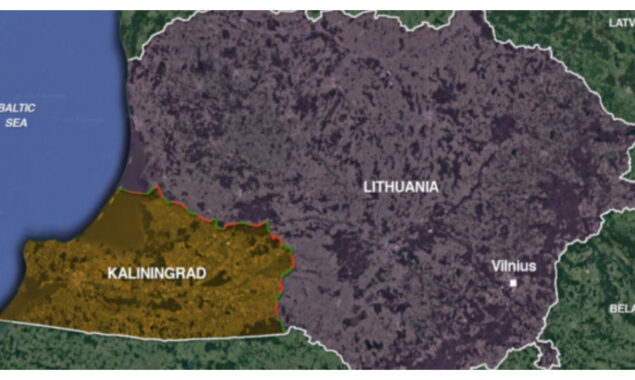
Russia threatens to retaliate as Lithuania bans rail transit to Kaliningrad
- Russia demands that Lithuania lift restrictions on rail transit of EU-approved goods to Kaliningrad.
- Russian foreign ministry says it has summoned Lithuania’s charge d’affaires in Moscow.
- Russia reserves right to take actions “to protect its national interests,” Russian ministry says.
Russia demanded on Monday that Lithuania lift its “openly hostile” restrictions on the rail transit of EU-approved goods to Moscow’s exclave of Kaliningrad, which borders Lithuania and Poland.
Moscow accused the Baltic country of prohibiting the rail transit of goods subject to European Union sanctions imposed in response to Russia’s military campaign in Ukraine.
In a statement issued on Monday, Russia’s foreign ministry said it had summoned Lithuania’s charge d’affaires in Moscow to protest the “provocative” and “openly hostile” measures.
“If in the near future cargo transit between the Kaliningrad region and the rest of the territory of the Russian Federation through Lithuania is not restored in full, then Russia reserves the right to take actions to protect its national interests,” the ministry said.
Read More: Zelensky expects Russia attacks to intensify at this week EU conference
According to the ministry, the transit ban violates a 2002 Russia-EU agreement
The Kremlin said Lithuania’s decision was “unprecedented” and “in violation of everything there is”, and suggested that retaliatory measures would follow.
“The situation is more than serious and it requires a very deep analysis before formulating any measures and decisions,” Kremlin spokesman Dmitry Peskov told reporters.
Earlier on Monday, Lithuanian Foreign Minister Gabrielius Landsbergis said the ban was imposed in compliance with European sanctions over Ukraine.
“These are European sanctions that started to work from June 17,” he told journalists in Luxembourg, specifying that in this case, it concerned the rail transport of steel products.
Ukraine’s Foreign Minister Dmytro Kuleba criticized Russia following the statement from Moscow’s foreign ministry.
“Russia has no right to threaten Lithuania. Moscow has only itself to blame for the consequences of its unprovoked and unjustified invasion of Ukraine,” Kuleba said in a statement on social media.
According to Kaliningrad governor Anton Alikhanov, the ban will affect between 40-50 percent of all imports to the exclave.
The list includes coal, metals, construction materials and advanced technology.
Speaking to Russian state TV on Monday, Alikhanov said the situation was “unpleasant but solvable” and the goods could be delivered by sea.
These goods were not intended for trade in Europe but for “supplying” the region, he added.
Wedged between EU and NATO members Lithuania and Poland, the heavily militarised exclave of Kaliningrad does not share a land border with Russia.
The region — previously called Konigsberg — was captured by Soviet troops during World War II and when the Baltic states became independent with the dissolution of the USSR in 1991, the region became cut off from Russia.
Read More: China-Russia trade up 28.9% in January-May
The region on the Baltic Sea’s coast is home to Russia’s Baltic Fleet, and Moscow claims to have deployed nuclear-capable Iskander missiles there.
For years, relations between Moscow and Lithuania, as well as its Baltic neighbors Latvia and Estonia, have deteriorated, exacerbated by Russia’s increased tensions with the West.
Read More News On
Catch all the World News, Breaking News Event and Latest News Updates on The BOL News
Download The BOL News App to get the Daily News Update & Follow us on Google News.




